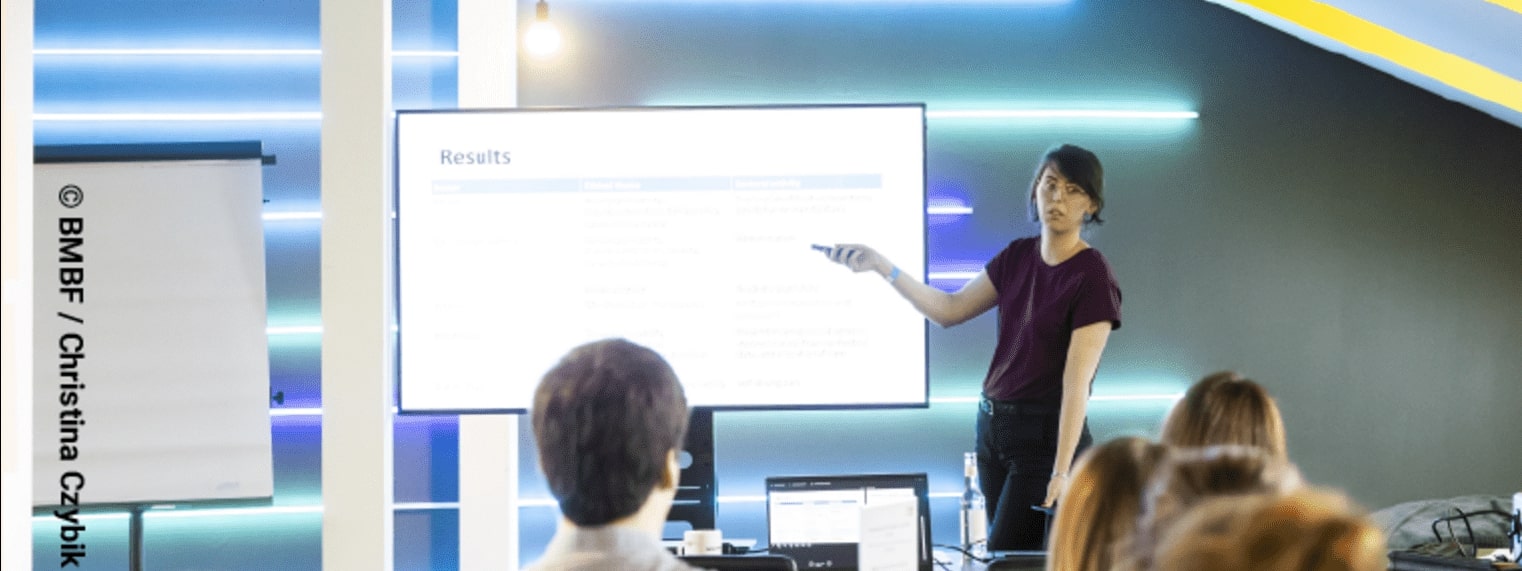Advancing Ethics in AI: Science of Intelligence Gives its Contribution at “KI-Camp 2023” Event of the Federal Ministry of Education and Research
On 26 April, 2023, Dafna Burema, postdoctoral researcher at Science of Intelligence (SCIoI), contributed to the highly anticipated KI-Camp organized by the German Federal Ministry of Education and Research (BMBF) and the German Informatics Society (GI) with an interactive session titled “Artificial Intelligence: Examples of AI gone wrong and ethical questions.” The session was moderated by head of Berlin Science Week Luiza Bengtsson.
The KI-Camp is a free convention that aims to address future transdisciplinary issues in the field of AI, and offers a unique opportunity for experts and early-career researchers in the field to come together and exchange ideas. This year’s event featured interactive discussion rounds, lecture sessions, and hands-on formats covering topics ranging from society and sustainability to health, art, and niche phenomena in AI research. With her extensive knowledge and expertise in the field, Dafna explored ethical and social implications of AI.
At SCIoI, Dafna works on two projects related to ethical and trustworthy artificial intelligence (AI). Her work includes creating a definition and conceptual framework for the use of social robots in elderly care, analyzing the biases towards older adults in the designing of these technologies, and creating guidelines for ethical and trustworthy AI. All of this requires a careful examination of potential societal risks derived by AI applications.
The Artificial Intelligence Act, passed in 2021 by the European Commission, aims to regulate AI by balancing innovation with the protection of citizens’ rights and safety by establishing four risk categories: unacceptable risk, high risk, limited risk and minimal risk. As a result, different AI systems can be regulated by law, depending on which category they are assigned to. The categorization process to label a certain AI application as more or less harmful is not as straightforward though. In her session at KI-Camp, Dafna explored together with her audience the challenges of allocating AI systems to different risk categories. Through her work, Dafna is contributing to the development of an AI that is not only technologically advanced, but also socially responsible.
Why Ethics Matter: The Role of AI in Society
In recent years, artificial intelligence (AI) has become more and more prevalent in our lives, and concerns around its ethics have grown. Because of that, there has been a rise in interdisciplinary efforts to address the ethical implications of relying on data-driven systems. Examples of key issues are: identifying and mitigating bias, fostering transparency through documentation, and understanding accountability and legal liability. The trend towards integrating ethical considerations is particularly important in technical fields that have not traditionally prioritized these considerations, such as computer science, engineering, and data science.
“AI ethics is a pressing concern that requires urgent attention,” Dafna explained. “With the increasing sophistication of AI systems, ethical considerations are becoming ever more complex. Beyond the issue of bias, there are broader questions around the societal impact of AI and the potential for these systems to exacerbate existing inequalities, like access and affordability, privacy and data protection and discrimination. There is also a need to consider the ethical implications of AI development and deployment, including issues of accountability and transparency.”
In addition to her work at SCIoI, Dafna also has an active role in other partnerships: she is the leader of the “work package on technological maturity and AI Ethics” at ETAMI (Ethical and Trustworthy Artificial and Machine Intelligence). The association pursues the goal to promote responsible AI innovation that prioritizes human values and rights, and addresses the social, ethical, and legal implications of AI technologies. By connecting her work at the Cluster with the endeavors of other academic and industry partners who strive to develop a trustworthy and ethical AI, Dafna is contributing to the development of AI technologies that can benefit society while minimizing potential risks and harms.






